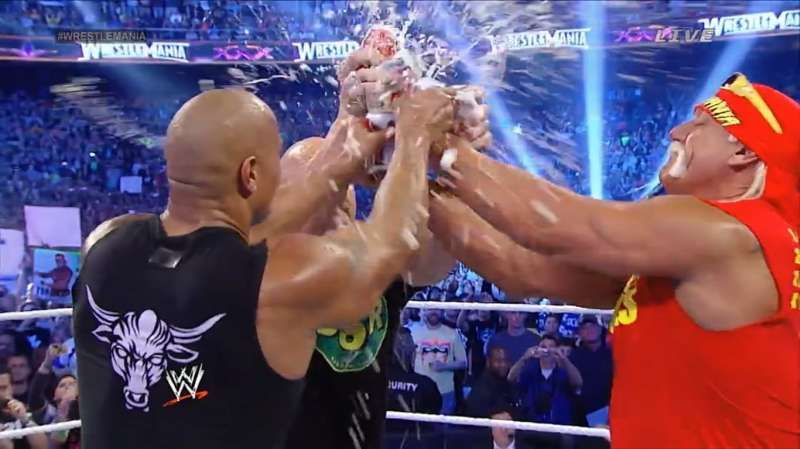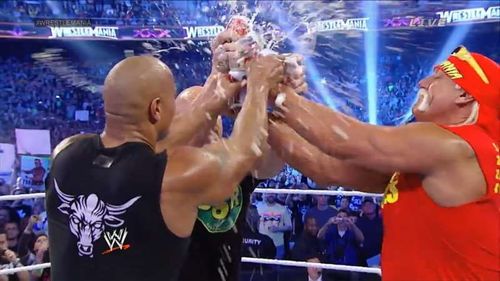
The era of the dominant WWE megastar is officially over
When you think back to the different WWE generations, one or two names stand out as the dominant forces during that time, but with the way things are going, the era of one Superstar being the driving force behind the entire company appears to be over.
During WWE's national expansion, Bruno Sammartino was the unstoppable champion who held the title for years at a time. He headlined countless shows at Madison Square Garden and wrestled the toughest men Vince McMahon could throw at him.
Then there was the '80s wrestling boom. Andre the Giant was an attraction all by himself, Hulkamania was running wild, The Ultimate Warrior was making a name for himself and Ric Flair was on his way to becoming one of the most decorated champions in the history of the sport.
During the early to mid-'90s, WWE put guys like Diesel, Bret "Hitman” Hart and Shawn Michaels in the spotlight. Management started bringing in ridiculous characters like Doink and Men on a Mission, but Hart and HBK were holding it down in the main event.
Then the Monday Night Wars ushered in the Attitude Era. The women became sexier, the product became edgier and WWE began trying to attract a more mature audience. The Rock and Stone Cold Steve Austin didn't just rule the business; they became pop culture icons.
Once WWE decided to clean up its image, John Cena and Randy Orton became the top babyface and heel respectively. Triple H was still in the mix, but Cena and Orton dominated the title scene for several years.
While both men are still part of the roster, their roles have changed significantly. Instead of headlining every pay-per-view, they are working with other stars that the management is trying to turn into the next power players.
The past few years have been great for WWE in terms of talent acquisitions. Not only has the company hired many names we thought we would never see in a WWE ring, but they have been treated like the big deals they were before signing a contract.
AJ Styles, Samoa Joe, Shinsuke Nakamura, Finn Balor, Hideo Itami, Austin Aries, Bobby Roode and Kevin Owens are just the tip of the iceberg. It's an embarrassment of riches when it comes to talent, but it also creates the problem of having too many people who deserve the top spot at the same time.
Even with two top titles between Raw and SmackDown, WWE still has too many people who deserve to chase the WWE Championship, sitting on the sidelines or pursuing midcard belts. While this might not seem like an issue to fans, it definitely creates problems for those in charge.
Back when Hulkamania was running wild, WWE only had a handful of people who were even in consideration for a run with the title. Everyone else worked midcard or tag team matches, and for many years, this formula worked.
It wasn't until the mid-'90s when WWE started putting the title on whoever was getting the best reactions every night. Once WWE had bought and closed most of the regional promotions, it handpicked the top talents and the rest fell to the wayside.
Fortunately for the whole industry, WWE is no longer the only game in town. Many have made comfortable livings working on the indy scene, in Japan or in other parts of the world.
Smaller promotions like Ring of Honor and TNA can help prepare someone for a WWE career, but those companies don't want everyone to jump at the first offer from McMahon and co.
Another reason WWE is so flush with main event talent is because the criteria for being a top star has changed. WWE is more willing to push smaller Superstars than it used to be, and it's easy to see why.
Styles, Rollins and countless others are far more exciting to watch than a guy who is too muscular to move around comfortably in the ring. There are still powerhouses like Cena, Reigns and Strowman, but they are largely outnumbered by Superstars who are closer to cruiserweights than heavyweights.
All of the changes listed above have led us to this point, but there is one more thing preventing WWE from building a new megastar; the fans. The WWE Universe is no longer filled with people who will cheer for anyone who acts like a good guy and boo anyone who acts like a villain.
Today's fan is more educated on the ins and outs of the industry thanks to the internet, and it has led to people bucking trends and cheering for whoever they like the most, not who the company wants them to cheer for.
WWE would love to have another Superstar like Hulk Hogan selling out arenas and pulling in millions of viewers, but with the current state of the industry, we might never see another person reach that level again.
Send us news tips at fightclub@sportskeeda.com
